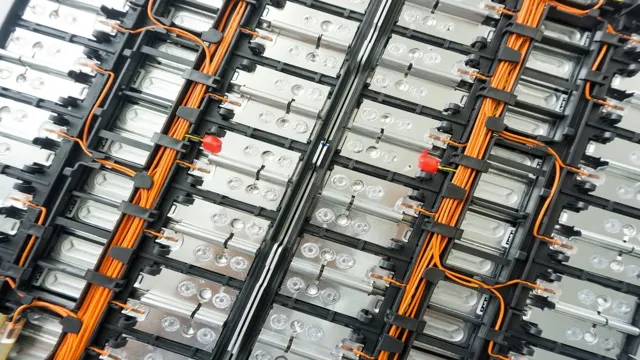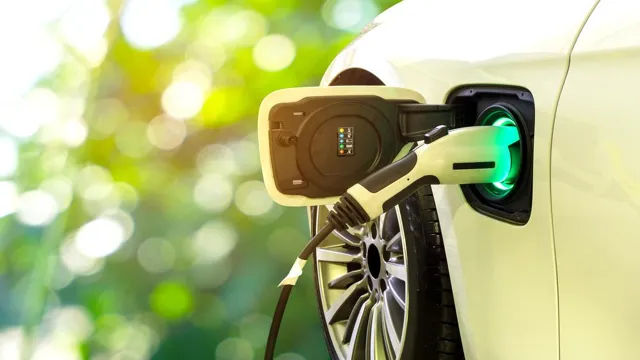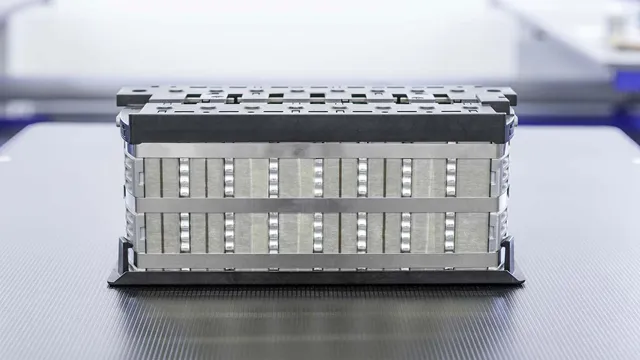Driving towards a greener future: Examining the environmental impact of electric car batteries
Electric cars have long been touted as the future of clean, eco-friendly transportation. However, with the increasing demand for electric vehicles, the question arises, are electric car batteries really eco-friendly? At first glance, it seems like a no-brainer. Electric cars don’t produce harmful emissions that pollute the air we breathe, making them an attractive option for environmentally-conscious consumers.
But what about the production and disposal of electric car batteries? Are they really as eco-friendly as they seem? The new trend towards sustainability and eco-friendliness has raised many questions about the impact of electric car batteries on the environment. While it is true that electric cars are much better for the environment than gasoline-powered cars, the production of lithium-ion batteries has been a hot topic of debate. Many argue that the mining and transportation of the materials needed to make batteries have a significant environmental impact.
So, are electric car batteries really eco-friendly? The answer is not as simple as a yes or no. While it is true that the production of electric car batteries requires significant amounts of energy and resources, the benefits of eco-friendly transportation cannot be ignored. It’s a trade-off between the immediate environmental impact of producing batteries versus the long-term benefits of transitioning to sustainable transportation.
Despite the challenges, advancements in technology are being made every day to make electric car batteries more eco-friendly. Research and development are pushing the boundaries to improve the sustainability of batteries, from reducing the use of toxic materials to finding new ways to recycle and reuse them. All in all, electric car batteries are an essential component of eco-friendly transportation.
While there are still challenges to overcome, the benefits are clear: cleaner air, a healthier planet, and a brighter future for generations to come.
Environmental Impact of Electric Car Batteries
Electric car batteries have a significant impact on the environment, but whether they are environmentally friendly or not is debatable. The production of electric car batteries requires mining for raw materials like lithium, cobalt, and nickel, all of which can have negative environmental consequences. Additionally, the production process generates a significant amount of carbon emissions, which can harm air quality.
However, compared to traditional gas-powered cars, electric cars emit less greenhouse gases, making them more environmentally friendly in the long run. Moreover, as batteries improve, the amount of raw materials needed decreases, and recycling programs become more efficient, the impact of electric car batteries on the environment is likely to reduce significantly. So, while electric car batteries are not entirely environmentally friendly, they are still a step towards a greener future.
Carbon Emissions in Battery Production
The environmental impact of electric cars is an increasingly important topic in today’s world. While electric cars emit little to no emissions while driving, the production of their batteries still leaves a significant carbon footprint. The production process includes mining for metals such as lithium and cobalt, which require a lot of energy and result in greenhouse gas emissions.
Additionally, the manufacturing and transportation of these batteries also contribute to carbon emissions. However, it’s important to note that the overall carbon footprint of electric cars is still significantly lower than traditional gasoline vehicles, even taking into account the production of their batteries. As advancements are made in battery technology, we can hope to see further reductions in emissions during production, making electric cars an even more sustainable choice for the environment.

Disposal and Recycling of Batteries
Electric car batteries have a significant environmental impact. The disposal and recycling of these batteries must be done in the proper way to minimize their ecological footprint. When batteries reach the end of their life, they contain toxic chemicals like lead, nickel, and cobalt that can pose a serious risk if not handled appropriately.
The process of recycling electric car batteries requires specific techniques and methods to extract and reuse the valuable metals like lithium and cobalt. These metals can be used in new batteries, which is essential for reducing the number of batteries that end up in landfills. Recycling the battery also reduces the demand for new raw materials required for making new batteries, thus reducing greenhouse gas emissions and other pollutants that are released during the manufacturing process.
While much work still needs to be done to optimize the end-of-life phase of electric car batteries, there is hope that through ongoing research and development, we can preserve the planet for future generations.
Comparing Electric Car Batteries to Traditional Car Batteries
Many people are curious as to whether electric car batteries are truly environmentally friendly. While there is no definitive answer, it is true that electric car batteries do have some benefits over traditional car batteries. For one, they are more energy-dense, meaning that they can hold more energy per weight than traditional batteries.
This makes them more efficient and effective, which translates into less damage done to the environment. Furthermore, electric car batteries are often produced using environmentally-friendly materials such as lithium or nickel, both of which are plentiful and naturally occurring. All in all, while there may be some concerns about the overall impact of electric car batteries on the environment, they are generally considered to be a step in the right direction towards creating a greener and more sustainable future.
Reducing Greenhouse Gas Emissions
Electric Car Batteries When we talk about reducing greenhouse gas emissions, electric cars come to mind as a promising solution. But what about the batteries that power them? How do they compare to traditional car batteries in terms of environmental impact? Well, electric car batteries are made of lithium-ion, which is a rechargeable technology that emits less CO2 during production and use than traditional car batteries. Moreover, they have a longer lifespan and can be recycled.
Traditional car batteries, on the other hand, are filled with lead and acid that can be harmful to the environment if not disposed of properly. So, it’s safe to say that electric car batteries are a more sustainable option. But there are still challenges ahead.
The production of electric car batteries requires rare metals, which raises concerns regarding their availability and ethical sourcing. Nonetheless, the benefits of electric car batteries in reducing greenhouse gas emissions outweigh these challenges, especially if we work towards a circular economy that promotes recycling and responsible sourcing of materials.
Efficiency and Longevity
When comparing electric car batteries to traditional car batteries, it’s evident that electric car batteries have a higher efficiency and longevity. Electric car batteries have a higher energy density, which means they can store more energy without taking up much space. This, in turn, provides a longer driving range and fewer charging cycles, reducing the frequency of replacing or upgrading the battery.
The maintenance costs for electric cars are also lower than traditional vehicles as the batteries don’t require regular fluid changes or tune-ups. On the other hand, traditional car batteries have a shorter lifespan and need replacement more frequently, requiring frequent maintenance and a higher cost to replace. In summary, electric car batteries showcase a superior level of efficiency and longevity compared to traditional car batteries, making them an ideal choice for those looking for cost-effective and environmentally-friendly options.
Cost Analysis
When it comes to the cost analysis of electric car batteries versus traditional car batteries, there are several factors to consider. Electric car batteries are generally more expensive than traditional car batteries due to the high cost of the materials used to make them. However, electric car batteries are designed to last significantly longer than traditional car batteries, which means that over time, the cost per mile of driving an electric car can be lower than that of driving a traditional car.
In addition, electric cars are generally more efficient than traditional cars, which means that they require less energy to operate, resulting in lower fuel costs. Overall, electric car batteries may be more expensive upfront, but they can provide significant savings over time, making them a smart investment for environmentally conscious drivers looking to reduce their carbon footprint and save money on fuel costs in the long run.
Future of Electric Car Batteries
Are electric car batteries environmentally friendly? The answer is not a simple yes or no. While electric car batteries have the potential to be much less harmful to the environment than traditional gas-powered cars, there are still concerns over the mining of the materials used in the production of these batteries. Lithium mining, in particular, has been linked to environmental damage such as ground and water pollution.
However, there are efforts being made to implement more sustainable and environmentally responsible mining practices. Additionally, the disposal of electric car batteries is another concern, as they may contain hazardous materials. However, it is possible to recycle these batteries and reuse the materials.
Overall, while electric car batteries are not perfect, they do have the potential to be a more environmentally friendly option, and as technology continues to advance, it is likely that these batteries will become even more sustainable in the future.
Research and Development
As electric cars become more prevalent on our roads, the development of their batteries is becoming increasingly important. The future of electric car batteries is looking brighter with researchers working hard to improve their efficiency, affordability, and range. With the current technology, most electric cars can travel around 200-300 miles on a single charge.
However, researchers are working on developing batteries that can travel over 500 miles on a single charge. This would make driving an electric car much more convenient, and it could potentially lessen range anxiety among drivers. Additionally, researchers are studying the use of new materials in the production of batteries, including anode and cathode materials.
Organic materials such as wood, algae, and other plant fibers are being researched as possible battery materials. These materials are lightweight, abundant, and inexpensive, which would make electric cars more affordable and accessible to everyone. The future of electric car batteries is bright and full of possibility!
Innovation in Recycling and Disposal
The future of electric car batteries is bright, thanks to the advancements in recycling and disposal practices. As the demand for electric cars increases, it’s essential to have a sustainable and eco-friendly way of managing their batteries, which contain valuable and limited resources. Recycling facilities can extract precious metals like cobalt, nickel, and lithium from used batteries, reducing the need for mining and preventing environmental damage.
Besides, these metals can be repurposed and integrated into new batteries, reducing the costs of production and increasing their lifespan. When disposing of electric car batteries, proper techniques must be followed to prevent harm to individuals and the environment. For instance, some batteries may contain toxic materials that require specialized handling and disposal.
These innovative recycling and disposal methods will undoubtedly shape the future of the electric car industry, making it more sustainable and responsible towards the planet.
Conclusion
To put it simply, electric car batteries are like the hipsters of the transportation world – they’re environmentally friendly before it was cool. Their rechargeable technology, minimal emissions, and recyclable materials make them an attractive option for eco-conscious drivers. So if you’re looking to reduce your carbon footprint and join the electric car revolution, rest assured that your battery will have Mother Nature’s stamp of approval.
“
FAQs
How do electric car batteries impact the environment?
While electric car batteries are more environmentally friendly than traditional gasoline-powered vehicles, they still have some impact. The extraction and production of materials used in the batteries can release greenhouse gases. However, the overall environmental impact of electric car batteries is much lower than that of traditional vehicles.
Are electric car batteries recyclable?
Yes, electric car batteries are recyclable. The materials used to make them, such as lithium and cobalt, can be extracted and reused. Recycling electric car batteries can help reduce the environmental impact of the production and disposal of the batteries.
Do electric car batteries require special disposal?
Yes, electric car batteries require special disposal due to the materials they contain. The batteries should be taken to a recycling center or returned to the manufacturer for proper disposal. Improper disposal of electric car batteries can harm the environment.
Are electric car batteries more expensive to produce than traditional car batteries?
Yes, electric car batteries are currently more expensive to produce than traditional car batteries. However, as technology improves and demand increases, the cost to produce electric car batteries is expected to decrease. Additionally, the environmental benefits of electric car batteries may offset the higher production costs.






